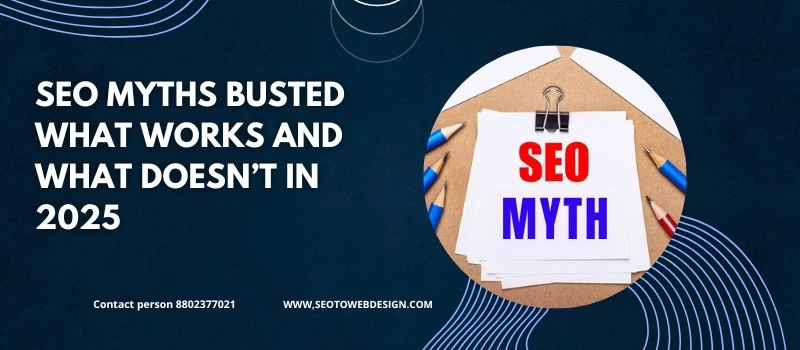1. Myth: Keyword Stuffing Improves Rankings
Busted: In the past, it was common to load pages with targeted keywords in an effort to rank higher. However, search engines like Google have become far more sophisticated. Keyword stuffing now results in penalization rather than ranking improvements. Google’s algorithms prioritize natural, high-quality content that provides value to users.
What Works in 2025: Focus on semantic SEO and user intent. Instead of stuffing keywords, aim for content that answers the user’s query. Use related keywords and phrases, and consider the context of the content. Creating engaging, informative, and well-structured content is the key to ranking higher.
2. Myth: Meta Tags Are All That Matter For SEO
Busted: While meta tags such as the title and description are important for SEO, they are no longer the sole factors that influence rankings. Search engines have evolved to consider a wide range of factors, from website speed to mobile optimization, in ranking websites.
What Works in 2025: Meta tags still matter for click-through rates (CTR) but should be part of a broader SEO strategy. Focus on user experience (UX), site speed, mobile responsiveness, and content quality. Ensure that your meta tags are optimized, but don’t rely solely on them for SEO success.
3. Myth: Backlinks Are The Only Ranking Factor
Busted: Backlinks are still a powerful ranking signal, but they are not the only factor that influences search engine rankings. Quality content, user engagement, and other on-page factors play a significant role in SEO success.
What Works in 2025: Backlinks are important, but quality matters more than quantity. Prioritize acquiring backlinks from reputable websites that are relevant and authoritative within your industry. Alongside backlinks, make sure your website is providing high-quality content and great user experience, which now weigh heavily in Google’s ranking algorithms.
4. Myth: SEO Is A One-Time Task
Busted: SEO is not a one-time activity but an ongoing process. SEO strategies evolve, algorithms are constantly updated, and competitor strategies shift. If you think you can set it and forget it, you’re missing out on long-term success.
What Works in 2025: Continuous optimization is crucial for staying ahead. Regularly audit your website for SEO improvements, update content, and adapt to algorithm changes. Monitoring and updating your SEO strategy are key to maintaining strong rankings in a competitive digital landscape.
5. Myth: Content Length Is What Matters Most
Busted: While long-form content has its benefits, content length alone doesn’t guarantee higher rankings. Quality always trumps quantity. Google rewards content that is comprehensive and answers user queries, but it doesn’t mean you should stretch content unnecessarily.
What Works in 2025: Focus on creating high-quality, relevant content that satisfies user intent. Rather than worrying about word count, aim for content that covers the topic thoroughly, provides value, and is well-structured. User engagement is a better indicator of content quality than length.
6. Myth: SEO Can Deliver Instant Results
Busted: SEO is a long-term strategy, and expecting overnight results is unrealistic. Building organic traffic takes time. If a service promises quick results, they may be relying on black-hat tactics that can lead to penalties.
What Works in 2025: SEO is about building authority over time. While some improvements (like fixing technical issues) can show faster results, the long-term success of SEO requires consistent effort. Regular updates, strategic content creation, and backlink building all take time to show tangible results.
7. Myth: Social Media Doesn’t Affect SEO
Busted: While social signals don’t directly influence rankings, the relationship between SEO and social media is undeniable. Social media can drive traffic to your website, increase brand awareness, and indirectly improve SEO by encouraging user engagement and backlinks.
What Works in 2025: Use social media to promote content and engage with your audience. Increased social shares, website traffic, and user interactions can improve your website’s visibility, which may eventually lead to improved rankings. Social media should be an integral part of your SEO strategy.
8. Myth: Duplicate Content Will Get You Penalized
Busted: Duplicate content doesn’t automatically result in penalties, but it can cause issues with search engine rankings. Google tries to rank the best version of the content, so having duplicate content may dilute your site’s authority and cause indexing issues.
What Works in 2025: Use canonical tags to tell search engines which version of the content should be indexed. If you need to use similar content across multiple pages (e.g., product descriptions), make sure to optimize each page to make it unique and valuable to users.
At Seotowebdesign, we specialize in SEO and web design strategies that combine the best of both worlds. Let us help you build a website that not only meets SEO requirements but also provides a seamless and engaging experience for your users. Stay ahead of the curve by focusing on what works in SEO, and avoid falling for outdated myths.

